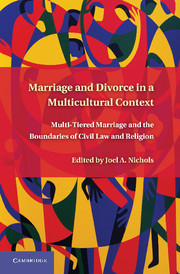 Marriage and Divorce in a Multi-Cultural Context
Marriage and Divorce in a Multi-Cultural Context Book contents
- Frontmatter
- Contents
- Detail Contents
- About the Editor
- List of Contributors
- Preface
- Permissions
- Introduction
- 1 Multi-Tiered Marriage
- 2 Pluralism and Decentralization in Marriage Regulation
- 3 Marriage and the Law
- 4 Unofficial Family Law
- 5 Covenant Marriage Laws
- 6 New York’s Regulation of Jewish Marriage
- 7 Political Liberalism, Islamic Family Law, and Family Law Pluralism
- 8 Multi-Tiered Marriages in South Africa
- 9 Ancient and Modern Boundary Crossings Between Personal Laws and Civil Law in Composite India
- 10 The Perils of Privatized Marriage
- 11 Canadian Conjugal Mosaic
- 12 Marriage Pluralism in the United States
- 13 Faith in Law? Diffusing Tensions Between Diversity and Equality
- 14 The Frontiers of Marital Pluralism
- Index
- References
1 - Multi-Tiered Marriage
Reconsidering the Boundaries of Civil Law and Religion
Published online by Cambridge University Press: 05 November 2011
- Frontmatter
- Contents
- Detail Contents
- About the Editor
- List of Contributors
- Preface
- Permissions
- Introduction
- 1 Multi-Tiered Marriage
- 2 Pluralism and Decentralization in Marriage Regulation
- 3 Marriage and the Law
- 4 Unofficial Family Law
- 5 Covenant Marriage Laws
- 6 New York’s Regulation of Jewish Marriage
- 7 Political Liberalism, Islamic Family Law, and Family Law Pluralism
- 8 Multi-Tiered Marriages in South Africa
- 9 Ancient and Modern Boundary Crossings Between Personal Laws and Civil Law in Composite India
- 10 The Perils of Privatized Marriage
- 11 Canadian Conjugal Mosaic
- 12 Marriage Pluralism in the United States
- 13 Faith in Law? Diffusing Tensions Between Diversity and Equality
- 14 The Frontiers of Marital Pluralism
- Index
- References
Summary
Introduction
The U.S. Supreme Court recently remarked, “Long ago [in 1890] we observed that ‘the whole subject of the domestic relations of husband and wife, parent and child, belongs to the law of the States and not to the laws of the United States.’” The context for the statement was a case followed by Court-watchers for a challenge to the validity of the Pledge of Allegiance. The very way it was made, in such an offhanded way, underscores how commonplace is the basic assumption that marriage and divorce law is entirely and exclusively a state law matter.
Even more basic than this federalism assumption are two further assumptions about family law, which run so deep they are virtually never even stated. The first is that the civil authority is the sole relevant authority for matters relating to marriage and divorce. The second is that within civil law there may only be one regulatory regime governing matters of marriage and divorce. Thus, there is an assumption of (1) exclusive jurisdiction, with all authority residing in the civil state; and (2) a “one-size-fits-all” model that applies to all couples, where no deviation from that model is permitted.
- Type
- Chapter
- Information
- Marriage and Divorce in a Multi-Cultural ContextMulti-Tiered Marriage and the Boundaries of Civil Law and Religion, pp. 11 - 59Publisher: Cambridge University PressPrint publication year: 2011
References
- 1
- Cited by
